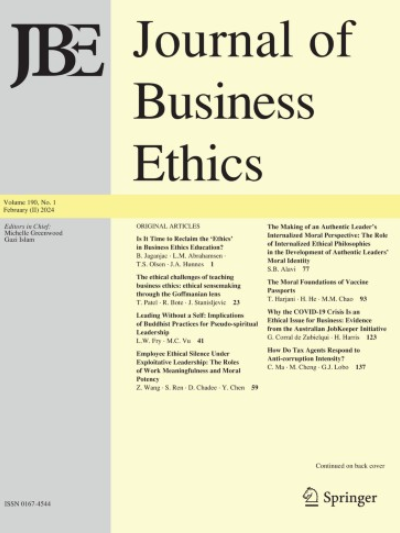企业家性别对银行融资影响的元分析
IF 5.9
1区 哲学
Q1 BUSINESS
引用次数: 1
摘要
本文对20年来的31项研究进行了荟萃分析,加深了我们对创业银行融资中的性别差距的理解。以往关于企业家性别与银行融资关系的研究结果喜忧参半,这表明需要特别关注企业家的社会背景。在这项研究中,我们开发了一个社会性别规范如何解释女性企业家(相对于-à-vis男性企业家)获得银行融资的差异的模型。具体而言,我们理论化了妇女在其社会中的正式(其国家的政治意识形态)和非正式(妇女赋权)社会地位如何影响创业银行融资中的性别歧视。与之前的大多数研究一致,我们的基线结果表明,女性企业家的商业贷款申请比男性企业家的贷款申请被拒绝的程度更大。女性企业家也比男性企业家支付更高的贷款利率。此外,在保守(而非自由)政治意识形态主导的社会中,女企业家与贷款利率之间的积极关系更为积极。有趣的是,拒绝贷款和利率方面的性别歧视在妇女赋权程度较高的社会中被放大。从社会性别规范的角度来看,我们的分析确定了创业银行融资中的性别差距,并概述了进一步研究的议程。本文章由计算机程序翻译,如有差异,请以英文原文为准。
A Meta-Analysis of the Impact of Entrepreneurs’ Gender on their Access to Bank Finance
Abstract This meta-analysis of 31 studies over 20 years advances our understanding of the gender gap in entrepreneurial bank finance. Findings from previous research on the relationship between entrepreneurs’ gender and bank financing are mixed, which suggests the need to pay particular attention to entrepreneurs’ social context. In this study, we develop a model of how social gender norms explain variation in women entrepreneurs’ (vis-à-vis men entrepreneurs’) access to bank finance. Specifically, we theorize how women’s formal (their nations’ political ideologies) and informal (women’s empowerment) social standing within their societies influence gender discrimination in entrepreneurial bank financing. Consistent with most previous studies, our baseline results show that women entrepreneurs’ business loan applications are rejected to a greater extent than men entrepreneurs’ loan applications. Women entrepreneurs also pay higher interest rates on loans than men entrepreneurs. Further, in societies dominated by a conservative (rather than a liberal) political ideology, the positive relationship between women entrepreneurs and loan interest rates is more positive. Interestingly, gender discrimination in loan rejection and interest rates is magnified in societies with greater women’s empowerment. Taking a social gender-norm perspective, our analysis establishes a gender gap in entrepreneurial bank finance, and we outline an agenda for further research.
求助全文
通过发布文献求助,成功后即可免费获取论文全文。
去求助
来源期刊

Journal of Business Ethics
Multiple-
CiteScore
12.80
自引率
9.80%
发文量
265
期刊介绍:
The Journal of Business Ethics publishes only original articles from a wide variety of methodological and disciplinary perspectives concerning ethical issues related to business that bring something new or unique to the discourse in their field. Since its initiation in 1980, the editors have encouraged the broadest possible scope. The term `business'' is understood in a wide sense to include all systems involved in the exchange of goods and services, while `ethics'' is circumscribed as all human action aimed at securing a good life. Systems of production, consumption, marketing, advertising, social and economic accounting, labour relations, public relations and organisational behaviour are analysed from a moral viewpoint. The style and level of dialogue involve all who are interested in business ethics - the business community, universities, government agencies and consumer groups. Speculative philosophy as well as reports of empirical research are welcomed. In order to promote a dialogue between the various interested groups as much as possible, papers are presented in a style relatively free of specialist jargon.
 求助内容:
求助内容: 应助结果提醒方式:
应助结果提醒方式:


